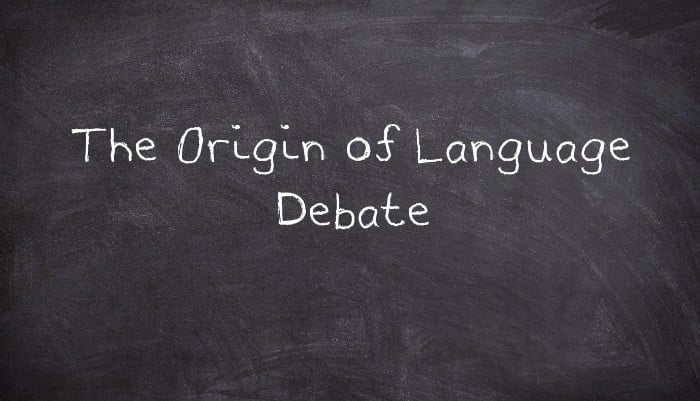Jelle Zuidema's essay "The Origin of Language Debate" contains a discussion about the theories put forward by Noam Chomsky and Steven Pinker (who provided the basis for the now widely accepted classical theory on the origin and development of language skills), and those provided by Luc Steels and Brian MacWhinney who attempt to propose an alternative theory.
The Arguments of Steels and MacWhinney
The summary of the arguments provided by Steels and MacWhinney towards the Origin of Language debate are as follows:
1. there is no universal grammar
2. innateness is not self-evident
3. there is no language organ
4. there are no language genes
5. modern languages evolve similarily to their origins
6. language emerged from cultural evolution
7. language emerged from embodiment
Some Comments on the Origin of Language debate
I find it hard to agree with many of the points made in the arguments listed above. There follows a disection of the given arguments:
Point 1 - There is no universal grammar
As a believer that language is the driving force of thought, I can't see the cognitive constraints as being separable from the notion of universal grammar. The basic concepts underlying language are unlikely to be the mere embodiments of concepts shared with non-linguistic animals. Can the notion of number be equated with what the hunter sees when approaching prey?
It is very unlikely that a universal grammar will be found and codified given its complexity, but this does not negate the concept.
Point 3 - There is no language organ
While the location and nature of the LAD (Language Acquisition Device) remain little understood or even identified, language is cerebral, so it is contained within one organ, the brain, about which we know very little.
Ponit 4 - There are no language genes
This is only true if number 3 is, which I find questionable. The fact that the human genome has been published does not mean that we have grasped how it all works, especially diachronically.
Point 5 - Modern languages evolve similarily to their origins
Language creation is not synonymous with creating an entire language. The fact that we can create new words or forms is not the same as the leap of thought that generated the first concepts.
Point 6 - Language emerged from cultural evolution
The two are so linked as to be simultaneous. Production of 'complexity' is not the proof that language can be forcibly 'evolved'.
Point 7 - Language emerged from embodiment
There is no consensus on the relationship between language and thought; I, like many others, believe the opposite of what is being argued here.
This does not sound worked out sufficiently to me.
The Bibliography given in the essay is as follows:
Pinker 1994 Steven Pinker, "The Language Instinct", 1994, New York: William Morrow
Williams 1951 F.C. Williams, T. Kilburn and G.C. Tootill, "Universal high-speed digial computers: a small-scale experimental machine", in: The proceedings of the institution of electrical engineers, vol. 98, part II, no. 61, February 1951
MacWhinney 1998a Brian MacWhinney, "An emergentist view on grammatical development" (abstract), in: 1998 AAAS Annual Meeting - Program Book
MacWhinney 1998b Brian MacWhinney, "The emergence of language", in: B. MacWhinney (ed.), The emergence of language, forthcoming, New Jersey: Erlbaum
Steels 1996 Luc Steels, "Synthesising the origins of language and meaning using co-evolution, self-organisation and level formation", in: J. Hurford (ed.), Evolution of Human Language, 1997, Edinburgh: E. University Press
Kosso 1995 Peter Kosso, "Reading the book of nature"
One Last Comment on Finite Language
While I believe language is finite, it is also inexhaustible. A Google search for language produced 33.9 million results. The search English language reduced it to 3.45 million results. Searching for the words together (ie: "English language") rather than anywhere in the text halved this figure and adding the took the score down to 737,000.
The falloff with such common words shows that finite language doesn't mean that there is any likelihood of reaching the end of language. The numbers are astronomical and incalculable, but that does not affect the theory. A bit like the comments above.
